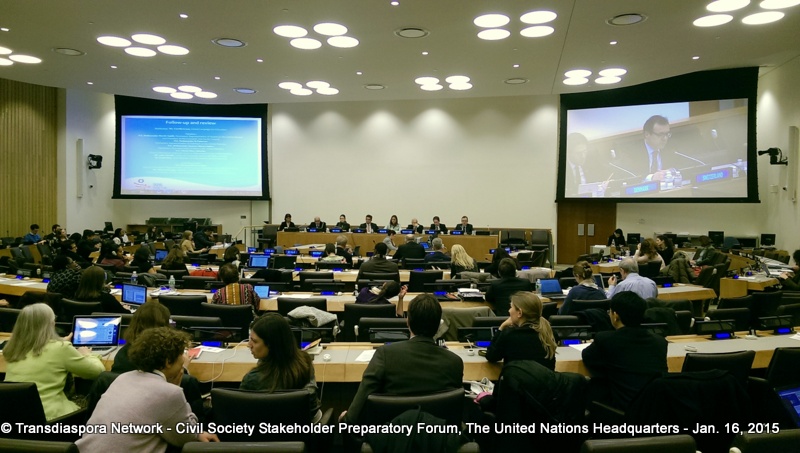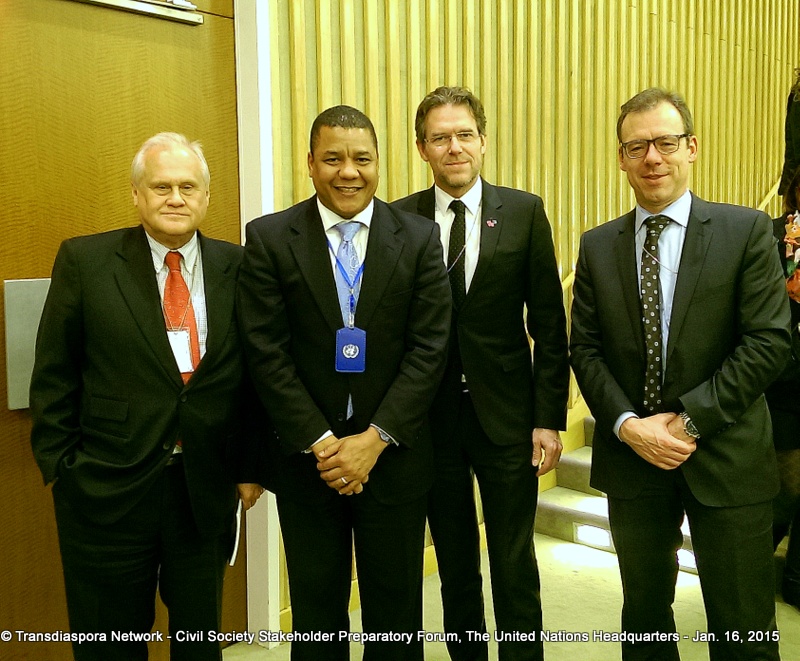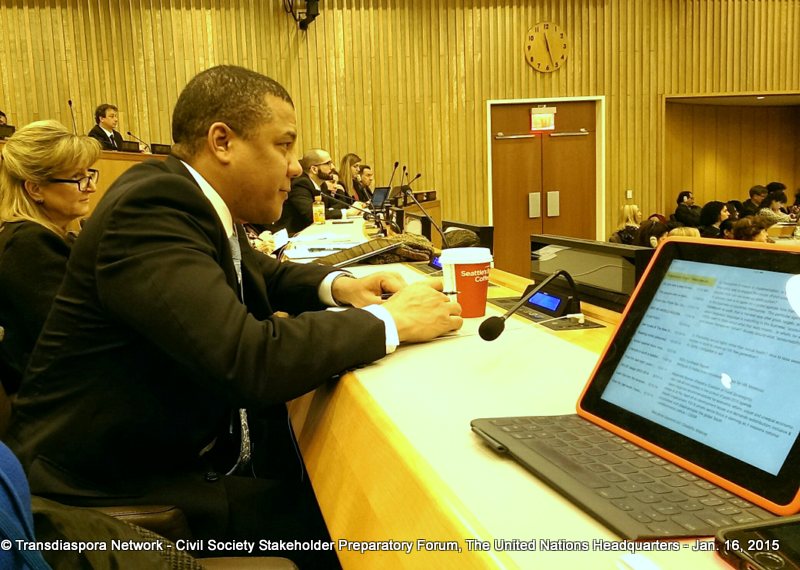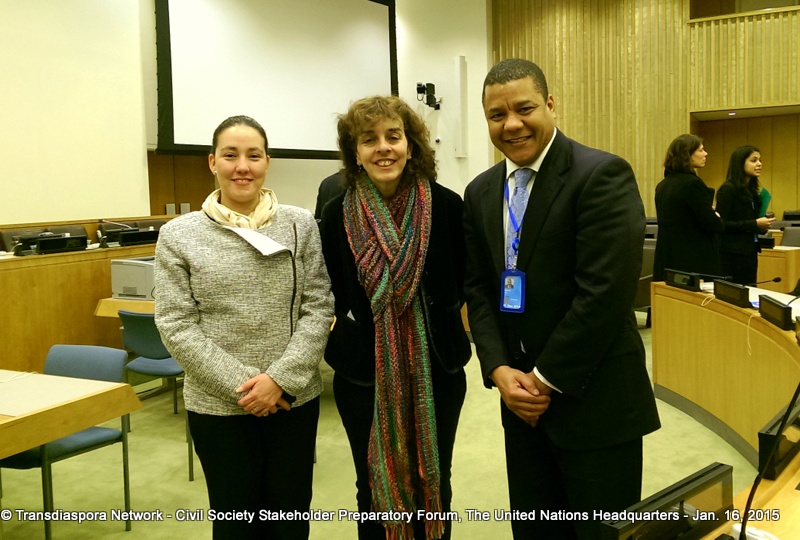Civil Society Stakeholder Preparatory Forum
New York, 16 Jan 2015 (summary excerpt available)
This meeting “Civil Society Stakeholder Preparatory Forum for the Post-2015 Development Agenda Negotiations” was an interactive dialogue between the President of the 69th session of the General Assembly and civil society organized by the Office of the President of the General Assembly, in collaboration with the United Nations Non-Governmental Liaison Service (UN-NGLS), the NGO Branch, Office of ECOSOC Support and Coordination (OESC), Department of Economic and Social Affairs (DESA), and NGO Relations, Department of Public Information (DPI). This preparatory forum brought together Major Groups and stakeholders to share their positions and priorities for the intergovernmental negotiations on the post-2015 development agenda, which tentatively are expected to begin immediately after the Forum. Participants also learned how they can effectively engage in the negotiation process going forward.
The Forum hosted approximately 400 participants, including UN Member States and the UN System and stakeholders from civil society and the private sector. Among the panelists, moderators and discussants the Forum featured civil society representatives from all different continents; as well as high level delegates from the UN Member States, including the two co-facilitators of the post-2015 intergovernmental negotiations from the Republic of Kenya and Ireland, Austria, Brazil, Canada, Denmark, Germany, India, Kingdom of Morocco, Peru, Romania, the Russian Federation, Switzerland, the United Kingdom and the European Union. High level officials of UN DESA and UN-NGLS as well as the president of ECOSOC participated.
CORE DEBATE HIGHLIGHTS (excerpt from Summary)
General Overview
- The need to shift to a development paradigm respectful of natural, human and cultural diversities: (…) We must ensure that the development paradigm that informs the post-2015 development agenda is cognizant of the world´s plurality and diversity, valuing and respecting cultures and people´s fundamental rights, as well as the rights of the Mother Earth and all living beings. It must be at the service and committed to Living Well (Buen Vivir) and to Development Justice, considering redistributive, economic, social, gender, environmental and intergenerational justice, as well as accountability to all people.
- Equality and overcoming all forms of discrimination: The post-2015 development agenda must thoroughly address the prevailing invisibility and inadequate representation and influence in decision-making processes of discriminated groups, including persons with disabilities, LGBT, women, older people, migrants, refugees and displaced people, indigenous peoples, afro descendants, workers, small-scale farmers, children and youth and other minority groups.
Focus on Secretary General’s (UNSG) Synthesis Report
- Private Sector: The UNSG´s Synthesis Report proposes to tap into private resources and facilitate foreign direct investments (FDI) in developing countries as well as Public Private Partnerships (PPPs). Evidence shows that FDI liberalization has sapped the resources and weakened the economies of many nations, while favoring transnational companies and banks. The negative impact transnational corporations have in threatening food and energy sovereignty, damaging ecosystems and livelihoods, must be made explicated, halted and reflected in the post-2015 development agenda. The latter should ensure compliance with the UN’s Guiding Principles on Business and Human Rights.
- Science, technology and innovation: Unequal access and use of technology is yet another factor that deepens inequalities. To foster sustainable development, technology must be people-oriented, inclusive, accessible, gender and age sensitive, participatory, apply precautionary principles and have justice at its core. Furthermore, indigenous and endogenous technologies must be strengthened. Technology must be designed to fit and benefit people of all ages and persons with disabilities. Existing intellectual property regimes build monopolies that reap profits for a few. Instead, technology must be conceived as a public good.
- Participation and partnership: Means of implementation (MOI) should not be built in a vacuum. Participatory research with marginalized groups has taught us that people are co-creating locally appropriate development solutions. MOI will only deliver sustainable results if they recognize and build on people´s agency for change. Contributions from active citizenship, people´s engagement and volunteering in extending development to the hard to reach and the uncounted populations should be
recognized and supported and systematically integrated into development policies and planning. - Financing for development: Financing for development strategies must address the implementation of all goals and targets of the Open Working Group (OWG) Report. Domestic resources must increase, including through improved progressive tax systems, the elimination of tax evasion and of corruption. ODA must remain a top priority while countries put in place the right public policies that halt fraud and money laundering. The trend to hold too many expectations on the private sector as the main solution for financing the post-2015 development agenda must be halted. National and international frameworks need to be put in place, compelling corporations to report on, and be liable for the social and environmental impacts and effects to human rights of their activities.
Follow up and Review
- Monitoring and accountability mechanisms: these must be considered as a core component of the overall post-2015 development agenda and there must be robust and comprehensive mechanisms, anchored on transparency, participation and the right to information, as well as encompassing extraterritorial obligations. We must understand accountability broadly, including reporting; monitoring by authorities, communities and independent bodies; data analysis; policy reviews; feedback, complaint and grievance mechanisms. The Forum acknowledged that while data disaggregation by marginalized groups is a fundamental aspect for monitoring and review, important questions remain open as to how to protect these groups from stigmatization, discrimination and criminalization depending on country context. Accountability mechanisms- from the local and regional levels, to the High Level Political Forum (HLPF)-must be backed by adequate financing. Furthermore, legal frameworks must be put in place to ensure effective participation of individuals and communities to capture best practices and lessons learnt, in line with paragraph 149 of the UNSG´s Synthesis Report, which recognizes the legitimacy and role of nongovernmental actors in accountability.

Focus Session on “Follow up and Review”

TDN President & Founder Ariel Rojas (center left) posing with H.E. Martin Sajdik (far left), President of ECOSOC; H.E. Ambassador Ib Petersen (center right), Permanent Representative of Denmark to the UN; and Jens Ole Bach Hansen (far right), Counselor of Economic/Social Affairs

TDN President & Founder Ariel Rojas attending focus session on the UN Secretary-General’s Synthesis Report

TDN President & Founder Ariel Rojas (right) posing with Norine Kennedy (center), Vice President of United States Council for International Business, and Bárbara del Castillo Niño (left), representative of Transparencia Mexicana
Buzz
- 11/04/2022 Latino Impact Summit - TDN President/Founder Ariel Rojas attended this event at the United Nations... read more>>
- 10/27/2022 Latin Grammy Awards - TDN Artistic Ambassador Glenda del Monte Escalante is a nominee for the next edition of the Latin Grammys... read more>>
- 10/24/2022 Heritage Celebration - TDN President/Founder Ariel Rojas attend community event Quisqueya: A Celebration of Haitian and Dominican Heritage... read more>>
- 10/21/2022 TDN / UN Women - TDN President/Founder Ariel Rojas and TDN Youth Ambassador Alicia Rando meet with UN Women representative... read more>>
- 09/09/2022 Book of Condolence - Because of Queen Elizabeth's death, TDN President/Founder Ariel Rojas signs book of condolence... read more>>
